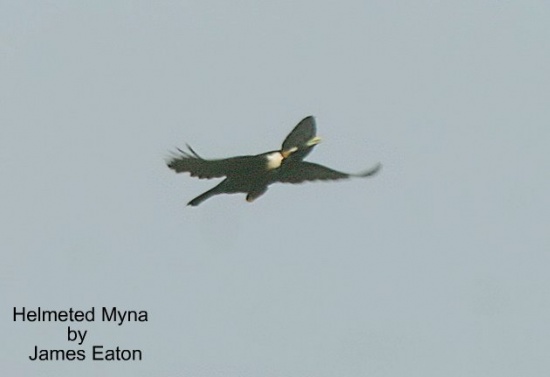(Basic update. C/right. References updated) |
|||
| (4 intermediate revisions by 3 users not shown) | |||
| Line 1: | Line 1: | ||
| + | [[Image:Helmeted_Myna.jpg|thumb|550px|right|Photo © by {{user|James+Eaton|James Eaton}}<br />Peleng ,Banggai Archipelago, [[Indonesia]], January 2010]] | ||
| + | '''Alternative names: Suly Myna; Greater King Starling''' | ||
;[[:Category:Basilornis|Basilornis]] galeatus | ;[[:Category:Basilornis|Basilornis]] galeatus | ||
==Identification== | ==Identification== | ||
| − | 9. | + | 25cm (9.4-9-8 in). A distinctive myna. |
| + | * Slightly iridescent black plumage | ||
| + | * Pale yellow bill | ||
| + | * Large white and buff patches on the side of the neck and breast | ||
| + | * Feathers of forehead, crown and nape pointed inward with central ones longer to form a distinct iridescent purple-black crest | ||
| + | Sexes similar. Juveniles have a shorter, duller crest, a brown chin, and a dark upper bill. | ||
==Distribution== | ==Distribution== | ||
| − | + | Endemic to Banggai Islands (Peleng and Banggai) and [[Sula]] Islands (Taliabu, Seho, Mangole), east of [[Sulawesi]], [[Indonesia]].<br /> | |
| + | A poorly known restricted-range species. | ||
==Taxonomy== | ==Taxonomy== | ||
| − | + | This is a [[Dictionary_M-O#M|monotypic]] species.<br /> | |
| + | May form a superspecies with [[Sulawesi Myna]] and [[Long-crested Myna]]. | ||
| + | |||
==Habitat== | ==Habitat== | ||
| − | Forest; also found in disturbed and cultivated areas and in mangroves. | + | Forest; also found in disturbed and cultivated areas and in mangroves. Occurs up to 1000m. |
==Behaviour== | ==Behaviour== | ||
Usually found in pairs, but also flocks; frequents tall trees. | Usually found in pairs, but also flocks; frequents tall trees. | ||
| + | ====Diet==== | ||
Only known to take fruit and berries from canopy to midlevels of trees. | Only known to take fruit and berries from canopy to midlevels of trees. | ||
| + | ====Breeding==== | ||
| + | No information about breeding. | ||
| + | ====Movements==== | ||
| + | A resident species. | ||
| + | ==References== | ||
| + | #{{Ref-Clements6thAug17}}#{{Ref-HBWVol14}} | ||
| + | {{ref}} | ||
==External Links== | ==External Links== | ||
{{GSearch|Basilornis+galeatus}} | {{GSearch|Basilornis+galeatus}} | ||
| − | [[Category:Birds]] [[Category:Basilornis | + | [[Category:Birds]] [[Category:Basilornis]] |
Latest revision as of 23:06, 3 June 2018
Alternative names: Suly Myna; Greater King Starling
- Basilornis galeatus
Identification
25cm (9.4-9-8 in). A distinctive myna.
- Slightly iridescent black plumage
- Pale yellow bill
- Large white and buff patches on the side of the neck and breast
- Feathers of forehead, crown and nape pointed inward with central ones longer to form a distinct iridescent purple-black crest
Sexes similar. Juveniles have a shorter, duller crest, a brown chin, and a dark upper bill.
Distribution
Endemic to Banggai Islands (Peleng and Banggai) and Sula Islands (Taliabu, Seho, Mangole), east of Sulawesi, Indonesia.
A poorly known restricted-range species.
Taxonomy
This is a monotypic species.
May form a superspecies with Sulawesi Myna and Long-crested Myna.
Habitat
Forest; also found in disturbed and cultivated areas and in mangroves. Occurs up to 1000m.
Behaviour
Usually found in pairs, but also flocks; frequents tall trees.
Diet
Only known to take fruit and berries from canopy to midlevels of trees.
Breeding
No information about breeding.
Movements
A resident species.
References
- Clements, J. F., T. S. Schulenberg, M. J. Iliff, D. Roberson, T. A. Fredericks, B. L. Sullivan, and C. L. Wood. 2017. The eBird/Clements checklist of birds of the world: v2017, with updates to August 2017. Downloaded from http://www.birds.cornell.edu/clementschecklist/download/
- Del Hoyo, J, A Elliott, and D Christie, eds. 2009. Handbook of the Birds of the World. Volume 14: Bush-shrikes to Old World Sparrows. Barcelona: Lynx Edicions. ISBN 978-8496553507
Recommended Citation
- BirdForum Opus contributors. (2024) Helmeted Myna. In: BirdForum, the forum for wild birds and birding. Retrieved 17 May 2024 from https://www.birdforum.net/opus/Helmeted_Myna




